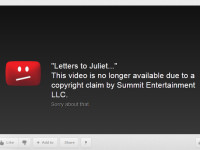Bill C-86, the Budget Implementation Act that includes extensive copyright reforms, passed the Senate and received royal assent last week. With little fanfare, the rules for Canada’s copyright notice-and-notice have now changed. The law no longer requires Internet providers to forward notifications that include the following:
(a) an offer to settle the claimed infringement;
(b) a request or demand, made in relation to the claimed infringement, for payment or for personal information;
(c) a reference, including by way of hyperlink, to such an offer, request or demand; and
(d) any other information that may be prescribed by regulation











